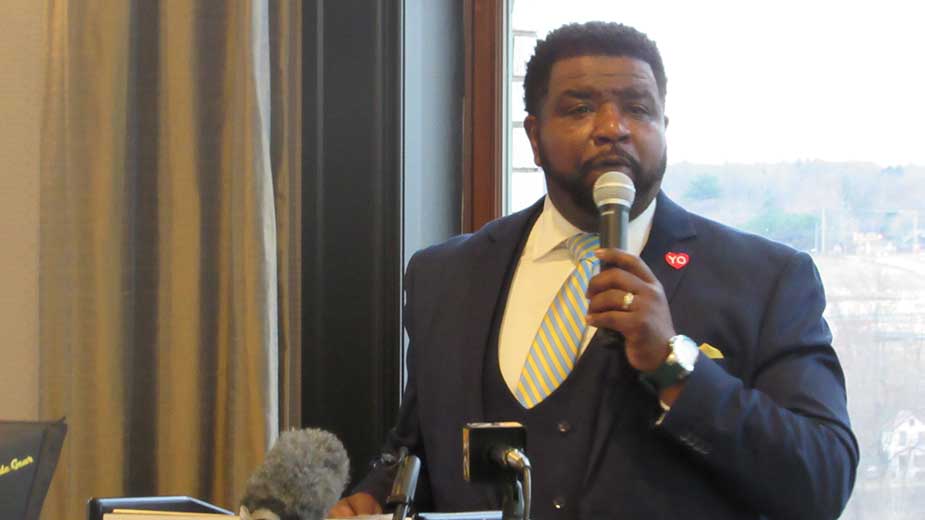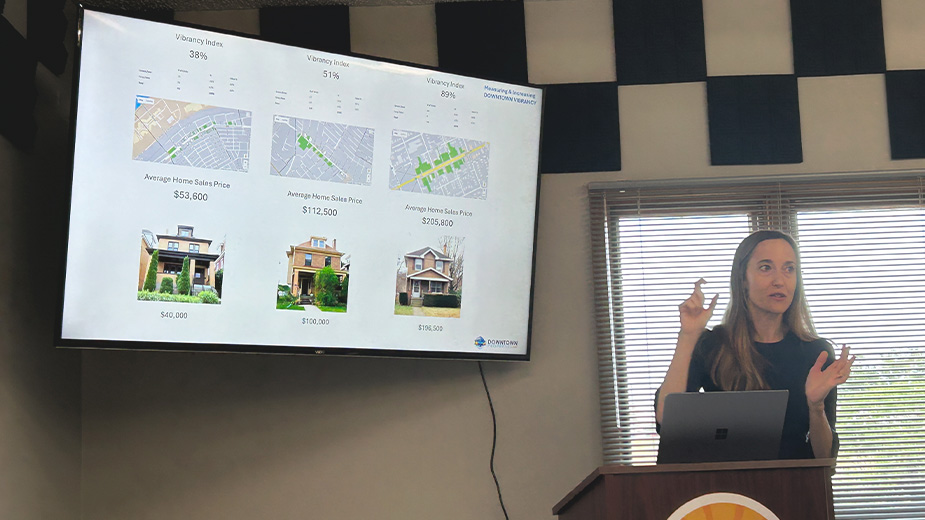$88.6M in Stimulus Funds, One Health Ohio Campus Highlight ‘Good Morning, Youngstown’
YOUNGSTOWN, Ohio — Public health and economic development were the common themes during the Youngstown/Warren Regional Chamber’s annual Good Morning, Youngstown breakfast Friday, particularly a proposed health campus project costing between $5 million and $7 million spearheaded by One Health Ohio.
The health center project, which has no formal name as of yet, will be located in the former Bottom Dollar food store at the corner of Glenwood and Indianola avenues. The campus will incorporate about five surrounding acres that One Health Ohio also owns.
The campus will be a “different type of health facility,” said CEO Dr. Ron Dwinnells, in that it will focus on prevention. While the center will provide services for medical and dental care, behavioral health care, medication-assisted treatment, pharmacy and lab testing, plans include a walking trail with physical fitness stations, community kitchen, greenhouses, café and even a carousel.
“We need to address the social determinants,” Dwinnells said. “That is how this society, how this social environment creates diseases in people.”
The center, at the corner of Glenwood and Indianola avenues, is in a food desert, where residents cannot readily access fresh foods and produce, he said. The site was the last full-service grocery store in the neighborhood. There are convenience stores, however.But they typically only carry foods that can lead to obesity. “And obesity is the gateway to chronic diseases,” such as diabetes, hypertension and even some forms of cancer, he said.
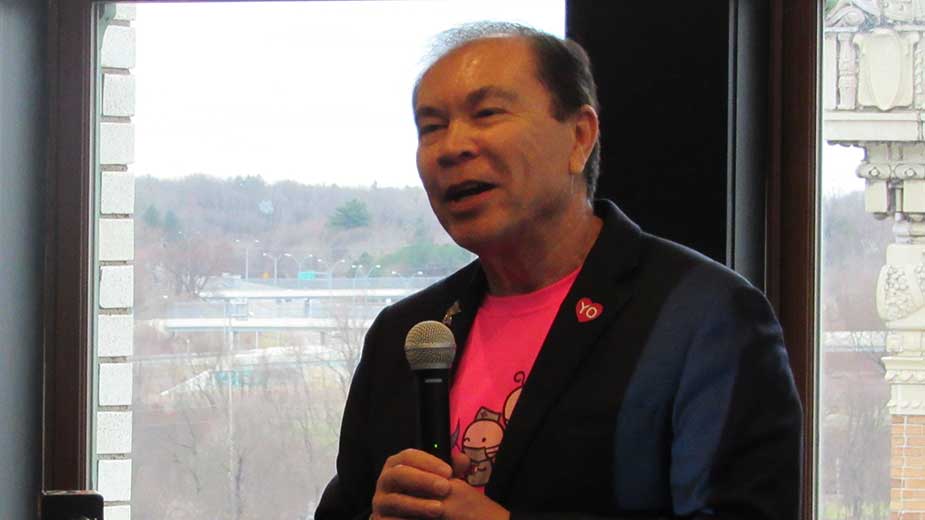
“The point is, shouldn’t we as a community health program providing medical, dental, behavioral health programs … shouldn’t we also be in the business of addressing the social determinants?” he said.
Amenities on the campus will be all-inclusive. For instance, produce grown in the on-site greenhouses will be prescribed to patients, who can pick it up free of charge. Dwinnells hopes to secure partnerships with area food banks to establish the center for food distribution as well, he said.
To engage area young people and families, one of the walking trails would be modeled after the children’s board game Candy Land and will feature multicolored tiles. The walking trails would also be secure.
“It’s a relatively high-crime area. People don’t go for walks and jogs,” Dwinnells said. Additionally, he hopes to include a secure corridor to access the nearby entrance to Mill Creek Park to lead residents on nature walks.
“We want to take health care to a different dimension,” he said. “I think this will be one of the first major sites that will directly address the social determinants.”
Internal renovations for the 18,000-square-foot building will likely cost some $3.5 million and will include preparing 50 to 60 rooms for services, Dwinnells said. When adding in the external plans, such as the walking trails, fitness stations and carousel, he expects the total cost for the project to run $5 million to $7 million.
Dwinnells is leveraging area partnerships to secure some financial support for the project. He expects to put the renovation and construction work out for bid this fall, with an opening for the campus sometime in late summer or early fall 2022, he said.
In 2018, One Health Ohio purchased the building from the city for $150,000 and initially announced plans for the center in July 2019. However, the coronavirus pandemic slowed progress of the project, Dwinnells said.
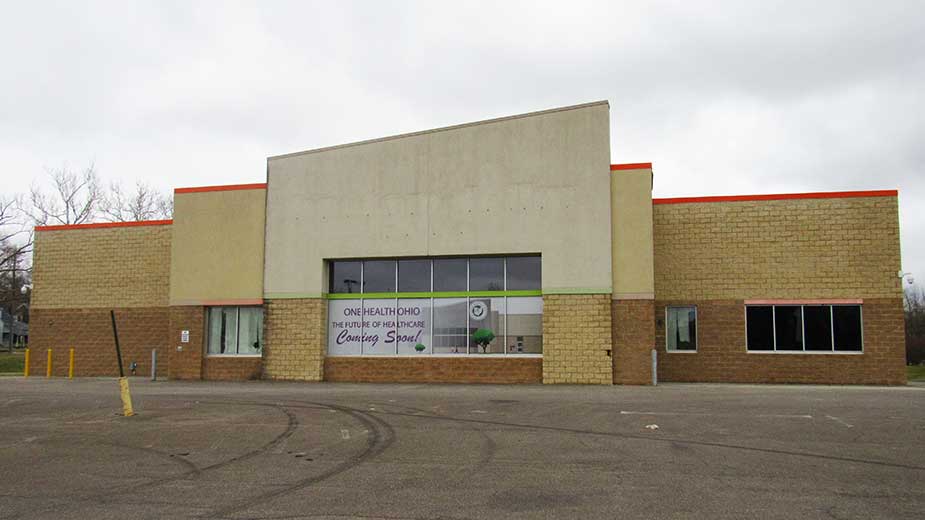
Guy Coviello, president and CEO of the Youngstown/Warren Regional Chamber, said he looked to connect with Dwinnells to see about getting the Glenwood project qualified for a new state program that could bring “millions of dollars in state money right to the Glenwood project.”
Public and community health was also on the mind of Mayor Jamael Tito Brown, who addressed the city’s ongoing efforts to combat the COVID-19 pandemic during his State of the City address. He lauded the “bold and courageous steps” of the Youngstown City Health District and Health Commissioner Erin Bishop to mitigate the spread of the virus.
“They navigated through this COVID pandemic over the last year with distinction and honor by having racism declared a public health crisis, promoting COVID-19 safeguards, supplying [personal protective equipment], working with individuals impacted by COVID-19 with relief assistance,” Brown said.
Moving forward, the mayor wants to ensure anyone who wants to be tested and vaccinated can do so, “particularly in the minority community,” he said.
Despite the challenges of the pandemic, the city continued to leverage local, state and federal investment dollars to improve city services, Brown said. Over the last three years, the city’s engineering department received $313 million in infrastructure investments to advance several roadway projects.
The Youngstown Police Department also used $800,000 in a federal Department of Justice grant to hep put more officers on the street, “especially focused on our community policing unit to build better community trust and relationships,” he said. Building trust with the communities was one of the top priorities for the newly appointed Chief Carl Davis, the mayor added.
Other city departments made efforts to keep services going. Though smaller, the Department of Parks and Recreation still held summer camps for kids and the Community Planning and Economic Development Department continued to host and conduct business outreach and engagement efforts to inform businesses about available federal resources through the Paycheck Protection Program and the Cares Act.
“We even did outreach city-wide for restaurants and bars as focus groups,” he said. “We wanted to make sure that those dollars were there, you could receive them, because I understand how valuable you are to this community.”
Moving forward, the mayor discussed his desire for a Youngstown Impact Plan, including a Blueprint out of Poverty committee to work with social service agencies and partners to identify barriers to eliminate poverty.
“We all talk about it. We all know it exists. But I think far too many times we operate in a silo,” Brown said. “I want to make sure we all come together collectively so that we can eliminate and reduce poverty.”
Other goals this year including working with Gov. Mike DeWine to pass “common sense gun laws” to remove illegal guns from the streets, promoting good-paying available jobs in the area and eliminating barriers that prevent residents from working those jobs, and expanding broadband access throughout the city’s neighborhoods.
“COVID-19 revealed a lot. And it showed us the disparities in the digital divide, specifically in our urban and city communities,” Brown said. “We want to make sure that when we have an opportunity, we want to expand our broadband access.”
The recently announced stimulus funds enacted through the federal American Rescue Plan will go a long way toward seeing some of these goals achieved. The city of Youngstown is expected to receive an estimated $88.63 million, which the mayor called “a legacy opportunity for Youngstown and the Mahoning Valley.
“Our focus and vision must be to create a strategic, comprehensive plan to impact this community for the next 10 to 20 years,” he said. “We all have a part in the plan. And it’s going to be key for us to make sure that our children and our grandchildren are effected by this opportunity for us.”
Brown looks to “measure twice and cut once” when it comes to executing this plan. The city will hire a designated compliance manager to ensure the funds are used appropriately and follow the guidelines of the Treasury Department, he said.
Possibilities for initiatives funded by the stimulus money include implementing a housing strategy to remove some 500 blighted properties in the city to improve the quality of life for residents. Part of that strategy includes constructing affordable, high-quality and versatile residences for people looking to live in the city.
“We want to make sure that we have multiple opportunities,” he said. “If individuals want a condo in the city of Youngstown, we have it. Townhouse, we have it. If you want to have a clean and lead-free home in the city of Youngstown, that’s what we’re going to strive to for our citizens.”
He also would like to implement youth employment programs, address food insecurities, improve the overall aesthetics of the city by cleaning up its corridors, and continue improving transit accessibility so residents can get to the jobs that are coming to the larger region.
“We need to continue to work with our partners at WRTA. They’re fixing bus routes to make sure those who want to work can get to work, and we have access so they can improve their life,” he said.
The funds will be distributed in two allocations, with the first half being dispersed in May and the second in 2022. The city has until 2024 to use the funds, so “there’s no rush to spend this money,” he said.
“That is why a plan is key to the success and to make this a legacy opportunity,” he reiterated. “This must be a focused, comprehensive plan that includes the citizens, city council, the mayor, our community partners in this room and those who are not. That we all sit down and come up with a roadmap to the future for the legacy.”
Brown noted the possibility of using the funds to potentially attract private investment, and said he is open to the idea of working with other areas receiving stimulus funds to pool their efforts for a larger project or initiative. Commercial corridors are “a great opportunity for us all to make sure the corridors are clean and look the same, no matter where you live – the township or the city.”
Also during Friday’s breakfast, Suzanne Barbati, president and executive director of Oh Wow! The Roger & Gloria Jones Children’s Center for Science & Technology, announced the May 15 grand opening of the center, which has been closed since the pandemic began. In that time, it conducted a $4 million redesign project.
“We’re on budget. We’re on time,” Barbati said.
COVID mitigation protocols will still be in place, including masks and social distancing, and the center will only be open to 25% of its capacity. But visitors can see the newly updated space on Thursday, Friday, Saturday and Sunday, with admission sessions of 9 to 11 a.m. and noon to 2 p.m., Barbati said.
Entry reservations are suggested and visitors will need to follow a one-way path through some Wow! Zones. Reservations can be made by calling 330 744 5914.
The long-awaited reopening of the center at 15 Central Square will be a boon for downtown and its businesses, Barbati said. Before the pandemic, the center drew 84,000 visitors downtown annually, she said.
“You can’t buy that kind of support for the restaurants and the stores,” she said.
Also opening this summer is Phase 1 of the new Penguin City Brewing Co. and taproom in the former Republic Warehouse downtown. The company capped 2020 by launching a $3.7 million renovation of the 32,704-square-foot building, which it purchased in December for $575,000.
Co-owners Richard Bernacki and Aspasia Lyras-Bernacki gave an update at the breakfast.
Penguin City has been brewing in the B&O Station downtown since 2019, as well as contracting some of its brewing operations with Paladin Brewing in Austintown. It will move its entire brewing operations to the new space, as well as open a tap room, event center and will welcome Dope Cider House & Winery as its first tenant.
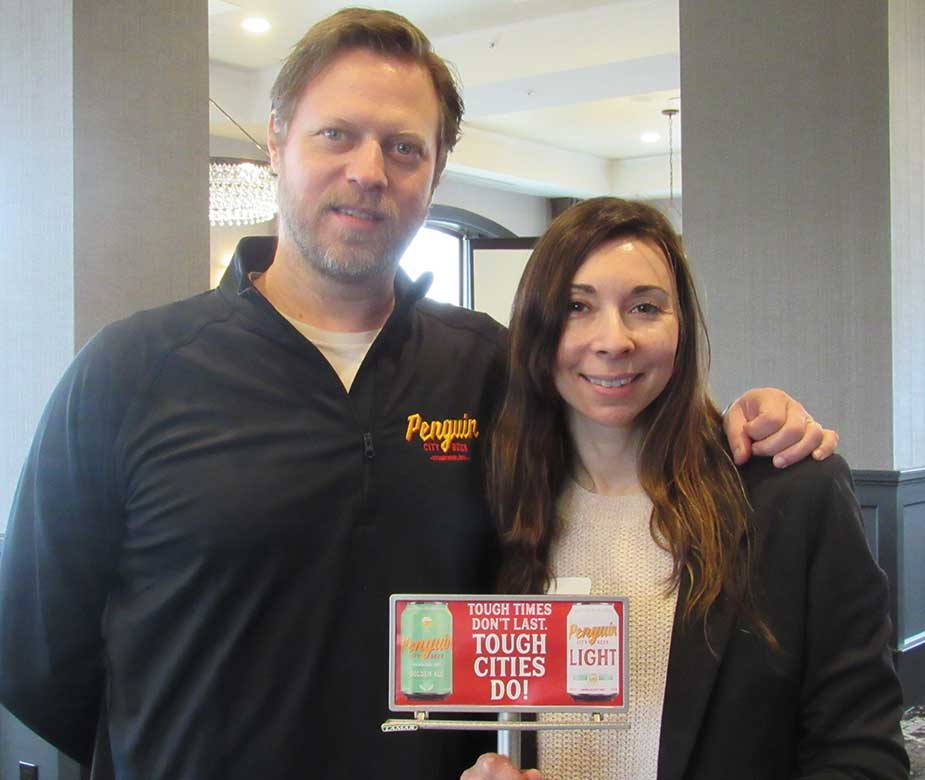
“I feel like I’m a train that is going full speed ahead and not stopping at all,” Lyras-Bernacki said.
The new space gives Penguin City the ability to employ a more efficient process and better tools, Richard Bernacki said. For instance, rather than moving ingredients and materials by hand, staff will now be able to use a forklift.
“Basically, we needed the right tools,” Bernacki said. “And one of the tools we need and really we’re missing out on was a place for the public and our community to come and congregate.”
Penguin City’s latest marketing effort is also gaining some national recognition. A recent billboard with the company’s motto “Tough times don’t last. Tough cities do,” is up for an OBIE Award, which recognize creative excellence in out of home advertising design. Among the other finalists are Absolut brand vodka and Corona Hard Seltzer.
The billboard was designed by Lyras-Bernacki’s cousin, Michael Pontikos, Penguin City’s brand manager and instructor for design and marketing at Youngstown State University.
Pictured at top: Youngstown Mayor Jamael Tito Brown speaks at the Youngstown/Warren Regional Chamber’s Good Morning Youngstown breakfast.
Copyright 2024 The Business Journal, Youngstown, Ohio.
